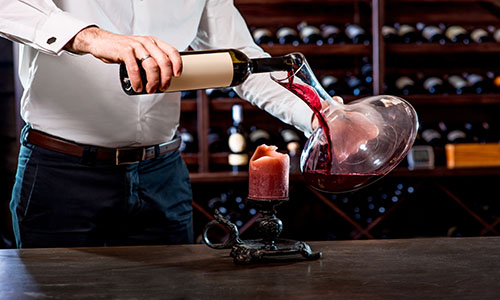Why do you need to decant red wine? Any smart wine steward can disclose to you that it’s important to give your Cabernet “a chance to breathe.” When you pour your glass, you should take one moment to delicately twirl it around. Look at the pattern of
“legs” on the grounds that the wine drips down within the glass. Perhaps take a legit sniff and wonder about the great notes of chocolate, cherry, and blackberry. Or then again, at any rate, just hang tight for a second or 2 preceding you down the whole glass.
Presenting red wine to the air by decanting does make them taste better by subtly changing their chemistry. There are 2 key procedures happening once a wine is presented to air: evaporation and oxidization. You won’t see wine vaporizing when you pour it in the glass, however, the most unstable segments, those that dissipate effectively, have just begun jumping into the air. That incorporates a portion of the wine’s ethanol, the liquor that that is found in wine.
While you wouldn’t wish every last bit of it to vanish, ethanol has an entirely solid smell, so it’s not the primary thing you need heading up your nose when you tip your glass towards your face.
Simultaneously, sulfites, which are added by winemakers to wine as an additive, likewise leave the decanter or the glass. These sulfur-containing particles can give the primary whiff of wine a spoiled eggy note. When these aromas territory unit reduced, you’ll have the option to truly smell the wonderful characteristics inside the wine, and how something scents huge affects how it tastes.
Circulating air through also opens the wine to substance components that causes oxidation: a translation of electrons that may move a compound’s properties and encourage separate atoms. In wines, among the first to respond with the extra contact with oxygen are phenolics: the things basically at risk for the shade of your preferred red or rosé.
The tannins everybody is discussing, for instance—are phenolics in wine that don’t have powerful flavours themselves yet motivation that drying feeling in your mouth after you drink a strong red. Oxidation separates them, progressing that astringent surface and allowing various flavours and smells to radiate through.
Phenolics originate from the grape’s skin and seeds, and since the red wine production technique includes longer contact with the whole grapes, more phenolics end up in the last item. That is the reason rich reds like Cabernet Sauvignons, Malbecs, and Sangioveses advantage from tapping and why red wine glasses are rounder and bigger, to build the measure of the wine that is in contact with air.
Fruity, fresh red wine have fewer tannins, so they needn’t bother with contact with air to such an extent, if by any means. Furthermore, an excessive amount of air circulation can demolish a more seasoned wine. In the event that oxidation is permitted to go excessively far, it will change and separate the delicious bits of the wine, straightening out flavours and smells.
Red wine will, in general, approve of a plug for two or three days, while whites become oxidized all the more rapidly. What’s more, you’ll have the option to try and witness it: whites become darker tinged, and reds turn more orangey. In this way, in case you’re drinking a solid red on a night out on the town, assets it sits inside the glass for two or three minutes or tapping the container would conceivably improve the aptitude.


